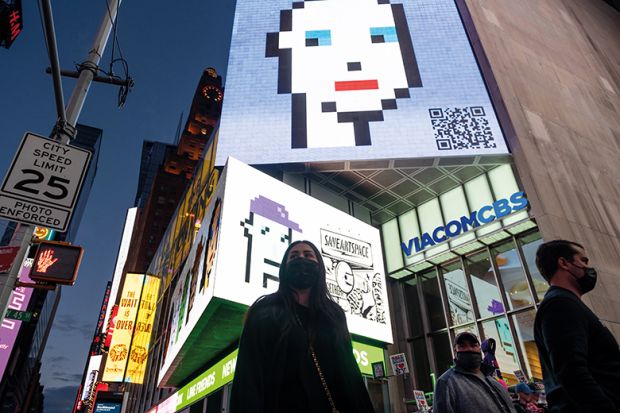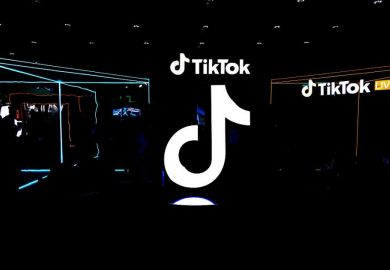Dozens of top US universities are stepping into the speculative world of NFTs, largely in sports-related initiatives seen as carrying potentially huge payoffs alongside major financial and educational risks.
NFTs, or non-fungible tokens, are described as highly secure online files containing unique content – such as images or videos – that are priced, like rare art, based on the value that sellers and buyers understand them to represent.
In an early sign of the possible windfalls for higher education, a private marketing company with more than 50 university partners said it held in March the first major online sale of college sports NFTs, selling its entire collection of 20,000 tokens within seconds.
“The platform and its popularity will support colleges and champion both current and former student athletes for years to come,” the online retailer, Recur, said after the sale, where individual NFTs were offered at prices ranging from $10 (£8) to $500. Its dozens of partner institutions include the University of California, Los Angeles and the flagship state universities of Michigan, North Carolina and Virginia.
The enthusiasm comes with substantial justification. Overall NFT sales numbers are astounding – global trading in the virtual tokens reached $17 billion last year, some 200 times the level of the previous year, according to NonFungible Corporation figures.
Yet experts are warning that NFTs appear to have limited earnings potential for higher education outside of sports, and potentially deeply counterproductive implications within it.
Outside of sports, credentialling is seen as one of the clearest post-secondary applications of NFTs. The idea is that NFTs are a convenient format for using blockchain, an online storage technology that could give students a permanent and unalterable way of keeping and presenting their academic degrees and certificates.
In that sense, college credentials offer “a welcoming landscape for NFTs”, according to an assessment by the NonFungible Corporation, a provider of NFT data analysis. The University of Georgia has already headed down that pathway, giving students in its New Media Institute their completion certificates in NFT formats.
That concept could be taken another step further by creating NFTs that illustrate accomplishments in individual classes, helping students give prospective employers a detailed understanding of what they have learned, according to an analysis by Beau Brannan, a visiting instructor of humanities at Pepperdine University.
Higher education may struggle, though, to find NFT applications that rival the pure money-making potential of sports. The best possibilities, said Arnaud Auger of the French-based global banking group BNP Paribas, likely include attempts to sell NFTs that benefit institutional fundraising and – in a mirror of the thinking with athletes – marketing NFTs that depict individual scientists and scholars, with the expectation that their NFTs will grow in value as their careers progress.
Those kinds of non-sports examples, however, seem especially speculative, at least until general NFT applications show signs of broader public acceptance, said Mr Auger, deputy head of C.Lab Americas, the innovation lab at BNP Paribas.
But the march of NFT profitability into higher education through sports may carry even greater uncertainties. That concern reflects the rise of NFTs just as the governing authority over US college sports, the National Collegiate Athletic Association (NCAA), has been relenting under political pressure to let student athletes profit from their $14 billion industry. NFTs instantly hand those athletes a prime profit-making opportunity, in that NFTs represent digital trading cards that players can easily produce and sell to their fans.
The NCAA over the past few years has reluctantly accepted the right of student athletes to pursue their own marketing ventures, as long as universities don’t give them the legal status of employees by paying them directly. But an intermediary such as Recur may be effectively erasing that line, by signing contracts with both universities and their athletes so the company can create NFTs depicting the athletes in their university kits.
By working with their top student athletes to create NFTs, said Andrew Zimbalist, a professor of economics at Smith College who specialises in the sports industry, universities appeared to be headed down an inevitable and destructive pathway towards legally making them employees.
That development likely would create a situation where only the most competitive 25 or 30 universities can keep their sports programmes, Professor Zimbalist said. The remaining US institutions probably would not have the resources or interest in maintaining their sports operations with professional employees, hurting the 98 per cent or more of student athletes who won’t have professional sports careers and simply need the scholarships provided by their collegiate teams, he said.
“There’s a whole dynamic that begins to take hold that is anti-education, that has to hurt the overwhelming majority of the athletes,” Professor Zimbalist said, anticipating a likely direction of NFTs. University leaders, however, seemed too beholden to in-the-moment pressure for sports-related profits to realise what was happening, he said.
“College presidents have never been strong enough – intellectually, emotionally and politically – to resist any of this,” Professor Zimbalist warned.
Register to continue
Why register?
- Registration is free and only takes a moment
- Once registered, you can read 3 articles a month
- Sign up for our newsletter
Subscribe
Or subscribe for unlimited access to:
- Unlimited access to news, views, insights & reviews
- Digital editions
- Digital access to THE’s university and college rankings analysis
Already registered or a current subscriber?








